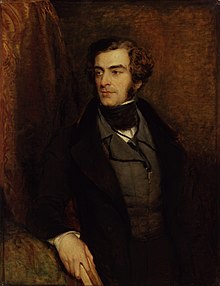Loading AI tools
British writer, lawyer and politician From Wikipedia, the free encyclopedia
Samuel Warren (23 May 1807 – 29 July 1877) was a British barrister, novelist and MP.
Samuel Warren | |
|---|---|
 Samuel Warren (c. 1835-40), by John Linnell. | |
| Born | 23 May 1808 Rackery Farm near Wrexham, Denbighshire, UK |
| Died | 29 July 1877 (aged 69) London, UK |
| Alma mater | University of Edinburgh |
| Occupation(s) | British writer, lawyer and politician |
He was born in Wales at Rackery Farm near Wrexham, Denbighshire, the son of Anne (née Williams), who died in 1823, and Samuel Warren (1781–1862), a Wesleyan Methodist minister, who formed a breakaway group, and in later life was an Anglican priest in Ancoats.[1][2] The memoirs of Samuel Dousland Waddy, an apprentice in 1820 to a London linen draper, state that Warren was also an apprentice there.[3] It is thought by Dunlop that as a teenager Warren worked in a medical capacity, perhaps as an apprentice to an apothecary.[4]
Warren attended the University of Edinburgh to study medicine, in the years 1826 to 1828, where he won prizes and attention, but did not take a degree. He then entered the Inner Temple, studying law and acting as a special pleader, and was called to the bar in 1837.[4] In 1852 he was made Recorder of Hull.
Entering politics, Warren sat in the House of Commons for Midhurst 1856–1859, and was a Master in Lunacy 1859–77. He was elected a Fellow of the Royal Society in April 1835.[5] He died in London.
Passages from the Diary of a Late Physician, by Warren but initially published anonymously,[6] was a series of sensational tales, fictional case histories, published first in Blackwood's Magazine from August 1830 to 1837. It was hugely successful.[4][7] The frame story to the series is of "early struggles" of a young medical man, and has been taken to contain embellished autobiographical material.[8] In the preface to fifth edition (1855) was Warren's statement that "I was six years actively engaged in the practical study of physic".[9]
The structure and use of professional anecdotes as a vehicle are now considered foundational for later mainstream crime fiction.[10] The tales contributed also to a sub-genre of the short story, known as "Blackwood's fiction", which often used the supernatural, or apparent supernatural, and owed something to John Ferriar and Samuel Hibbert-Ware.[11] Proposed bookends are an 1821 story by William Maginn, and one by Samuel Ferguson in 1837, when Warren's series had concluded.[12]

Warren was also the author of two novels:
The influence of Warren on Charles Dickens has been traced, for example in Bleak House.[4]
Warren was also a legal writer. His Select Extracts from Blackstone's Commentaries (first edition 1836) was with John William Smith, whose name did not appear.[13]
Warren married in 1831 Elizabeth (Eliza) Ballenger (died 1868), daughter of James Ballenger of Woodford Bridge House, Essex, who had married in 1824 W. Vanhouse; they had two sons and a daughter.[4][14][15] Eliza's father, who died in 1830, was a sugar refiner in Davenant Street, Whitechapel.[16][17]
The elder son, Samuel Lilckendey Warren (born 1835), graduated B.A. in 1859 and became an Anglian priest.[14][18] The younger son, Edward Walpole Warren (1838–1903), was another cleric, a Cambridge graduate. He was rector of Holy Trinity Episcopal Church, Manhattan, from 1887 to 1895.[19]
Warren married, secondly, Louisa Beaumont in 1871.[4]
Seamless Wikipedia browsing. On steroids.
Every time you click a link to Wikipedia, Wiktionary or Wikiquote in your browser's search results, it will show the modern Wikiwand interface.
Wikiwand extension is a five stars, simple, with minimum permission required to keep your browsing private, safe and transparent.